|
March 14, 2019
ABI
Workers
Reject Alcoa's Dictated Contract
and Back-to-Work Protocol
90 Per Cent
Turnout, 82 Per Cent Rejection of Company Contract at
Membership Meeting
PDF

• Workers
Want a Negotiated Contract Not One-Sided Company Dictate
• The Workers' Demand for an
Alternative to
Dictate - Pierre Chénier
Letter to the
Editor
• A Lockout Is Not a "Force
Majeure"
- Montérégie Metallurgical Worker
BC Rail Tragedy
and
Other Train Derailments
• Canadian Pacific's Reckless Move
• Rail Workers Defend Their Rights
and Safety
- Peggy Askin
• Arbitrator Issues Cease and Desist
Order to
CP Rail - Teamsters Canada
Rail Conference
• Growing Number of Rail
Accidents
New Brunswick
Criminalizes Workers' Just Claims
• Provincial Government and Court of
Queen's
Bench Declare Nursing Home Workers' Strike Illegal -
Interview, Simon Ouellette, Communications Representative, CUPE
Maritimes
ABI Workers Reject Alcoa's Dictated
Contract and Back-to-Work Protocol
 Smelter workers at
the
Aluminerie de Bécancour Inc. (ABI) held a general
membership
meeting on March 11, to discuss and vote on the latest contract
offer
of the Alcoa/Rio Tinto cartel. Eight hundred and thirty-one union
members participated in the meeting out of a current membership
of 926.
After serious discussion and presentations,
the 831 members in attendance voted 82 per cent to reject the
company's
proposed collective agreement. The workers, who have been locked
out by
the company for 14 long months, also rejected a company
back-to-work
protocol that had not been negotiated with the local union. Smelter workers at
the
Aluminerie de Bécancour Inc. (ABI) held a general
membership
meeting on March 11, to discuss and vote on the latest contract
offer
of the Alcoa/Rio Tinto cartel. Eight hundred and thirty-one union
members participated in the meeting out of a current membership
of 926.
After serious discussion and presentations,
the 831 members in attendance voted 82 per cent to reject the
company's
proposed collective agreement. The workers, who have been locked
out by
the company for 14 long months, also rejected a company
back-to-work
protocol that had not been negotiated with the local union.
The President of USW Local 9700, Clément
Masse,
gave his impressions of the meeting to Workers' Forum:
"The workers said that this is not a negotiated
agreement and accepting such an agreement is like saying you do
not
have a union anymore, that the employer can do whatever it wants.
The
offer that the employer presented shows a lack of respect for us
and it
is the same as regards the back-to-work protocol. We have built
our
union and we
have built our contracts over the years, and we do not agree that
we
should lose everything because the employer wants to smash the
union.
That is what came out of the interventions at the mic; that we
are
still able to stand up and will not accept just anything even
after 14
months. It is not true that the employer can impose its way of
doing
things on us. They will have to sit down and negotiate and show
respect
for the workers. The workers have also targeted the energy deal
with
Alcoa that is hurting us and doing nothing but prolonging the
conflict."
The union president also made the following
comment in
a statement issued by the Quebec Steelworkers on the evening of
March
11:
"The offer represented a series of take-backs by
the
company. ABI has refused to negotiate, it has refused to accept
third-party arbitration. It just wanted to impose its will,
counting on
fatigue from its 14-month lockout. The answer from our members is
clear: it didn't work. The members don't want to go back on their
knees. Alcoa disrespects our Labour
Code by negotiating in bad faith, it disrespects
Quebeckers by
making them pay for its lockout, it disrespects workers by
closing the
door on negotiation as well as arbitration. The government of
Quebec
must intervene. The imbalance of power is unacceptable and the
behaviour of this multinational is unacceptable."

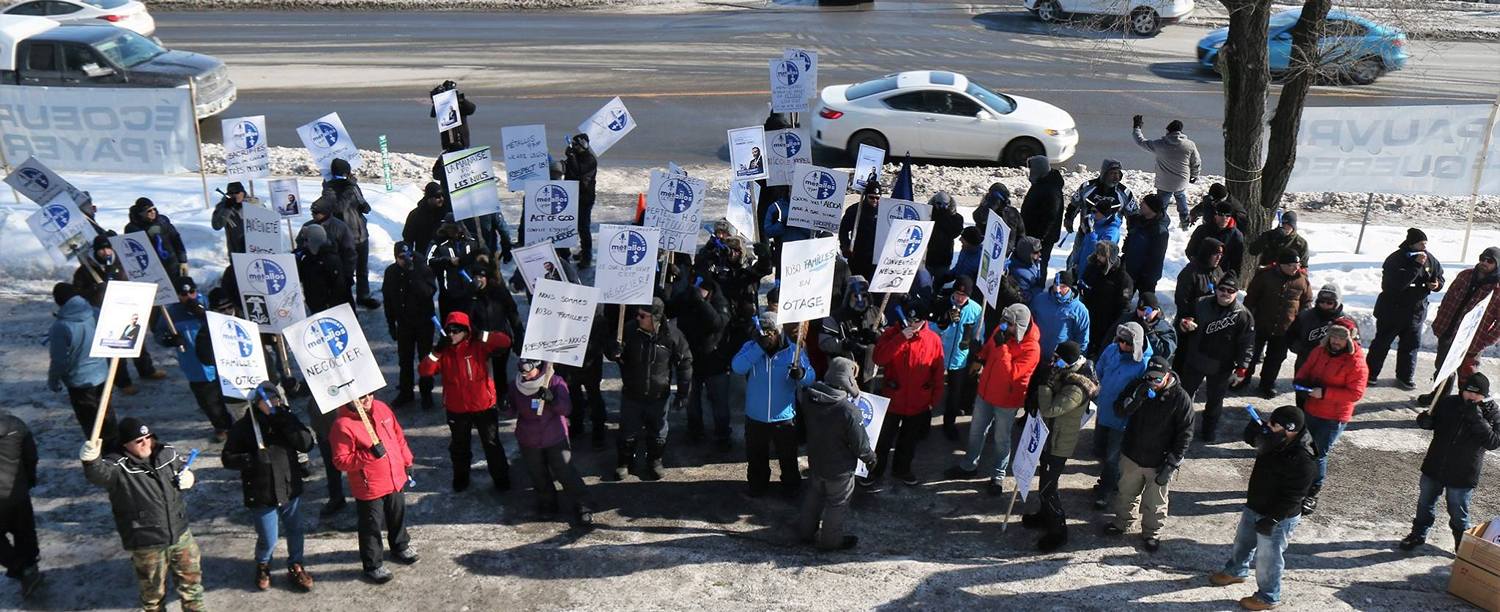
ABI smelter workers, March 1, 2019, outside Premier Legault's
office.
USW Local 9700 called a vote on the latest company
contract to ensure every member had a say and vote on the matter
after
14 months of lockout. Steelworkers pointed out that the offer and
accompanying back-to-work protocol are worse than what had been
negotiated before the January 2018 lockout was imposed, when only
two
points were in dispute.
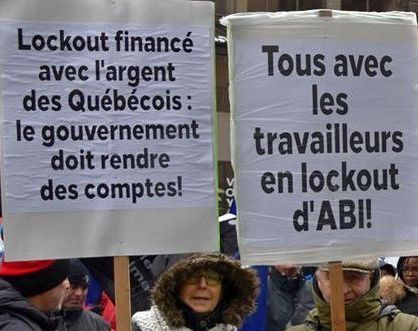 Workers highlighted
that
the current offer, or rather dictate, is vastly inferior to what
had
previously been negotiated regarding work organization,
scheduling, the
pension fund, respect for seniority, the use of subcontracting
and the
abolition of unionized positions. The so-called back-to-work
protocol
had never even been discussed with the union and could only be
considered disrespectful to workers and their rights. It demanded
the
return to work be spread over a period of 10 months, which could
be
extended according to various pretexts. During this time,
managers and
subcontractors could occupy the positions of unionized
employees. Workers highlighted
that
the current offer, or rather dictate, is vastly inferior to what
had
previously been negotiated regarding work organization,
scheduling, the
pension fund, respect for seniority, the use of subcontracting
and the
abolition of unionized positions. The so-called back-to-work
protocol
had never even been discussed with the union and could only be
considered disrespectful to workers and their rights. It demanded
the
return to work be spread over a period of 10 months, which could
be
extended according to various pretexts. During this time,
managers and
subcontractors could occupy the positions of unionized
employees.
"Such a prolonged return-to-work period is
unprecedented," Local 9700 President Clément Masse said.
"The
principle of a return-to-work protocol is to negotiate the
armistice to
the conflict. This protocol does the opposite, it sets fires. By
way of
comparison, following a labour dispute in 2004, everyone was back
in
the plant within six
weeks."
The union members made it clear during the
meeting and
with their vote that they do not want to go back to work under
these
conditions, even after a difficult 14 months of lockout and a
coming
period full of uncertainty.
Workers' Forum greatly respects the
decision of
the ABI workers to reject the company dictate. The courage and
determination of the ABI workers to defend their rights in the
face of
a powerful international force and a spineless government that
refuses
to do its duty and protect its own people, gives heart to
millions of
workers across
Quebec and Canada who are fed up with the current one-sided state
of
affairs between employees and employers.
Workers' Forum congratulates all those
across
the country who have come forward to support the locked-out ABI
workers
in many ways. The Alcoa/Rio Tinto cartel is not invincible but
the
struggle demands the active stepped-up support of all workers and
allies throughout the country. The determination of the organized
working class can win this battle for its rights, respect and
terms of
employment agreeable to those who do the work and produce the
social
wealth.

- Pierre Chénier -
An alternative to the current direction of
dictate over
workers and society by the global cartels must be found. The
broad
denial of rights within this dictatorship of powerful
supranational
cartels is unacceptable in a modern society. People have rights
by
virtue of being human. Companies, no matter how dominant they
have
become in their sector, cannot be allowed to violate the rights
of
employees or others in society. Governments have a duty and
social
responsibility to stand up and defend their citizens.
 The Alcoa/Rio Tinto
lockout
and dictate of terms of employment are not only an attack on ABI
workers but on all members of a civilized society. Employees must
be
accorded the respect they deserve as producers of the social
wealth
that companies crave and which the people, economy and society
require
for their existence. Respect and rights mean that workers must
have an
organized say and control over their terms of employment
including the
wages and benefits they are paid for their capacity to work and
the
working conditions at work. The terms of employment cannot be the
pragmatic product of what the company says it wants and needs to
compete in the global market. A collective agreement worthy of
the name
must be negotiated in an organized and respectful manner with the
representatives of the workers, and must gain the consent of
employees
and be beneficial for the workers, not just provide the company
what it
says it wants and needs. The Alcoa/Rio Tinto
lockout
and dictate of terms of employment are not only an attack on ABI
workers but on all members of a civilized society. Employees must
be
accorded the respect they deserve as producers of the social
wealth
that companies crave and which the people, economy and society
require
for their existence. Respect and rights mean that workers must
have an
organized say and control over their terms of employment
including the
wages and benefits they are paid for their capacity to work and
the
working conditions at work. The terms of employment cannot be the
pragmatic product of what the company says it wants and needs to
compete in the global market. A collective agreement worthy of
the name
must be negotiated in an organized and respectful manner with the
representatives of the workers, and must gain the consent of
employees
and be beneficial for the workers, not just provide the company
what it
says it wants and needs.
Modern workers refuse to be humiliated and have
their
rights violated. The Alcoa/Rio Tinto cartel is apparently drunk
on the
global strength of its operations and thinks that it can do
whatever it
wants without being held to account. This can be seen in its
rejection
of negotiations and imposition of a lockout even though the
differences
in the
proposed contract of 2018 were minor. The cartel has something
else in
mind such as the complete destruction of the local union and any
benefits, security and stability workers and their community have
gained through previous contracts.
The arrogance of the cartel can also be seen in
the way
it declared the lockout it had engineered as a "force majeure"
beyond
its control. In this way it refuses to pay for the block of
energy
Hydro-Québec produces and has set aside for the cartel at
preferential rates. It can be seen in the apparent ease in which
it has
gained the
compliance of the Quebec government for the lockout and the fraud
of a
"force majeure."
The Quebec government for its part refuses to
uphold
its duty to its citizens and hold the cartel to account even
though
Quebec workers and Quebec hydroelectric power are the human and
natural
resource that the cartel needs for its aluminum operations not
just at
Bécancour but elsewhere in Quebec and likewise in western
Canada.
An alternative to the dictate of the global
financial
oligarchy is not difficult to imagine but difficult to bring into
being
precisely because of the power, social wealth and political
allies the
cartels have amassed. The alternative has to come from the
organized
strength and determination of the working class, which ABI
workers are
exhibiting in
spades. This particular struggle can be won but everyone must
become
involved and raise their voices and intensify their active and
conscious participation in the ABI workers' resistance to the
denial of
their rights. The Quebec government must be denounced and
isolated as a
vile sellout of the Quebec people and nation. What kind of
government
is this that refuses to hold a global cartel to account and
allows it to abuse not only its employees but the Quebec people
and
their hydroelectric infrastructure?
Let us all redouble our support and active
participation in the struggle of the ABI workers for their rights
and
against the dictate of the global oligarchs. An alternative to
dictate
must be found! This struggle can be won!

Letter
to
the Editor
- Montérégie
Metallurgical
Worker -
I read with interest the article in the March 7
issue
of Workers' Forum "Workers Demand Legault Government Make
Alcoa/Rio Tinto
Meet Its Commitments on Energy Contract." I am closely following
the
lockout at ABI and I also think that it is fraudulent to consider
this
lockout as a "force majeure," "an unforeseeable, irresistible
event
beyond the control of a Party," which in this case is Alcoa. As
the
article says, the lockout is a planned operation to attack the
working
conditions and the union.
 I think one of the
crucial
moments that showed that the lockout is planned was what happened
on
March 8, 2018. After having liquidated in a few minutes what was
meant
to be
a negotiation session between the two parties in the presence of
the
mediator, ABI's management issued a statement saying: I think one of the
crucial
moments that showed that the lockout is planned was what happened
on
March 8, 2018. After having liquidated in a few minutes what was
meant
to be
a negotiation session between the two parties in the presence of
the
mediator, ABI's management issued a statement saying:
"Representatives of the Bécancour Smelter
(ABI)
management met with USW Local 9700 today, informing them that the
plant
needs fundamental changes to achieve long-term success. The
meeting
took place in the presence of Mr. Jean Nolin, the conciliator
appointed
by the Ministry of Labour.
"The constant objectives of ABI management during
last
year's long negotiations were to ensure the sustainability of the
plant
and to reach a negotiated agreement. However, the union's
pressure
tactics during these negotiations have caused a significant
deterioration of the operating conditions in the plant, creating
hazards for employees,
putting the products at risk, threatening the supply of customers
and
negatively affecting the financial performance.
"The union's rejection of a fair and competitive
offer
left ABI management with no choice but to take steps to protect
its
employees and the assets of the plant. Consequently, the rejected
offer
can no longer serve as a basis for a future settlement.
"ABI is not as competitive as it should be and
this
situation needs to be improved to succeed in the long term.
"As a result, ABI's operational structure needs
to be
re-evaluated with the goal of significantly improving
productivity and
workforce organization to ensure consistency for its
customers."
If this is not a planned operation to attack the
working conditions and the union, then what is it?
In this press release, ABI management is trying
to kill
two birds with one stone.
It declares the end of its previous offer, which
could
have led to a settlement through negotiations, and signals that
in fact
its aim is a complete restructuring of the ABI operation. At the
same
time it claims, after the fact, that its lockout was justified
because
the workers had sabotaged production and machinery and endangered
the
plant and
the lives of the employees when they were at work months before
the
lockout! And, it should be noted, this "sabotage" was never
raised at
the time, when the workers were at work.
In this press release, Alcoa is therefore trying
to
present the lockout as a defensive measure on its part against a
concocted "force majeure," the so-called sabotage by the workers
to
justify its decision that its offer is no longer valid and that
it must
carry out a complete restructuring of the place at the expense of
working conditions and the union!
This is illogical. It can certainly be said that rationality is
not the
strong point of ABI management, but it cannot be said that the
lockout
was not planned. From the beginning, Alcoa has had a hidden
agenda that
has been revealed more and more clearly ever since.
The Quebec government should not try to compete
with
ABI management over which has the more fraudulent arguments of
the two.
The Alcoa/Rio Tinto cartel has to pay for the block of energy
that is
set aside for it. This lockout is not a "force majeure." If the
government takes the side of the Quebeckers who it claims to
represent,
that will
put pressure on the Alcoa/Rio Tinto cartel to finally negotiate
so that
the lockout can end in a manner acceptable to the workers.

BC Rail Tragedy and Other Train
Derailments
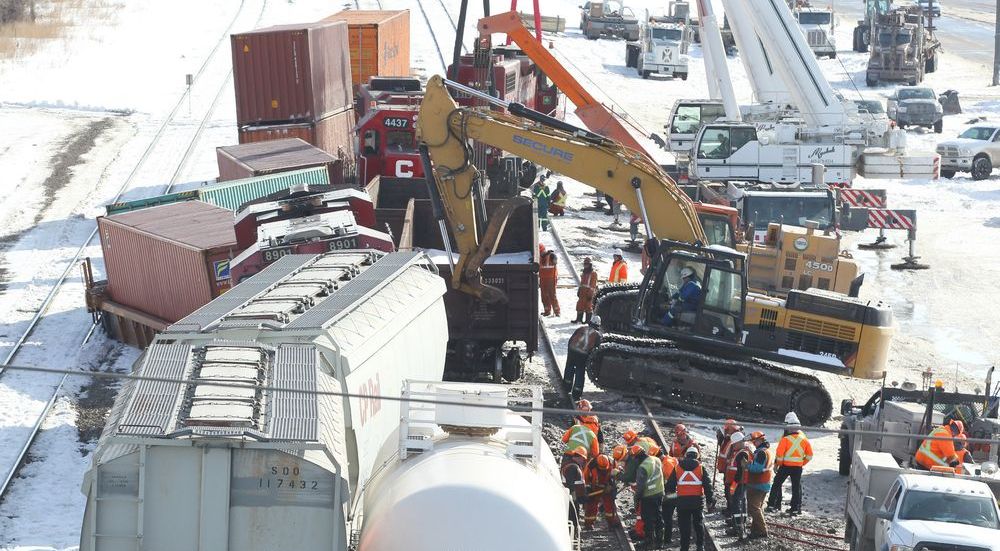
Train derailment in Calgary, March 9, 2019.
Canadian Pacific Railway (CP) announced on March 8
an
appeal of Transport Canada's Ministerial Order requiring the
application of handbrakes to secure a train when stopped on a
mountain
grade. According to CP, the Railway Association of Canada and
Canadian
National (CN) are also appealing the Ministerial Order issued on
February 8, in the wake of the
tragedy that occurred 4 days earlier.
The disaster in question took the lives of
conductor
Dylan Paradis, engineer Andrew Dockrell and trainee Daniel
Waldenberger-Bulmer. Their 112-car CP grain train sped out of
control
down a track in the Rocky Mountains and derailed. The train had
been
stopped on a mountain grade for two hours to address mechanical
issues
including
problems controlling the speed of the train. During the stop,
emergency
brakes were applied. The train began to move and accelerated to a
speed
in excess of the maximum track speed and derailed.
The Transportation Safety Board investigation
found
that no handbrakes had been applied. Transport Canada's February
8
Ministerial Order requires operators of trains halted in an
emergency
stop on a mountain grade to apply a sufficient number of
handbrakes to
prevent the train from moving.
Railway workers have long demanded more be done
to
secure trains and protect their lives and those of the public.
They
support the Ministerial Order regarding the application of
handbrakes.
They see this move as part of their fight to get to the heart of
the
problem of recurring accidents. This includes a public
investigation of
the
phenomenon of trains speeding out of control. They call for the
establishment of a public authority that enforces rail safety in
which
workers who have direct knowledge and experience of the industry
have a
say and control.
CP, in an uncouth and arrogant manner, announced
an
appeal of the Ministerial Order under the guise that the
application of
handbrakes will introduce "additional risks" and "unintended
consequences." CP advocates "safer options" yet remains silent on
those
options or what the additional risks and unintended consequences
might
be when
handbrakes are used.
Railway workers surmise that CP may be referring
to the
potential risks for conductors in moving along the train in an
unfavorable environment in order to apply handbrakes. They say
such
dangers, although real, cannot be compared with those of a train
speeding out of control after starting to roll on its own.
In an article dated March 1, the Globe and
Mail
reports Transport Canada held a briefing with the industry and
unions
at the end of February during which CP spoke on the need for
safety
measures that do not hamper operations by delaying traffic.
According
to the Globe article, CP
allegedly does not want time consuming
measures
such as applying hand brakes. It wants to keep the trains moving
with
minimum delays.
This has always been the pragmatic bottom line
and aim
of the rail companies to secure increased private profit
regardless of
the consequences for workers and communities along rail lines.
With
private profit as the aim and driving force of the industry, the
railway companies have long pushed self-regulation in concert
with
compliant
governments. This pragmatism for private profit has been shown in
practice to be a disaster for the safety of workers and the
public.
Train derailments keep happening and are actually on the rise
across
Canada. Railway workers and their allies across Canada are firmly
opposed to the unacceptable anti-social direction of
self-regulation of
the
industry and demand an alternative that favours the people. The
application of handbrakes on slopes is one measure in this
regard.
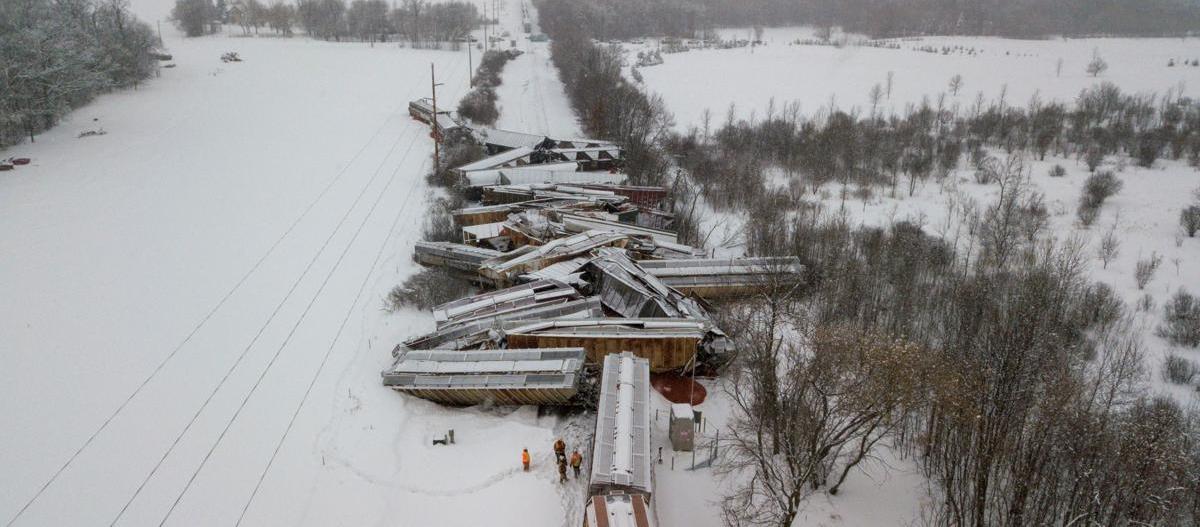
Train derailment, Carlos, Minnesota, March 1, 2019.

- Peggy Askin -
Railway workers continue to speak out to defend
their
rights and safety and demand solutions to deal with the extreme
hazards
they face on a daily basis. Four significant derailments of CP
trains
occurred recently. These derailments took place only one month
after
the death of three rail workers when a train derailed close to
the
Spiral
Tunnels near Field, BC and plunged into the Kicking Horse
River.
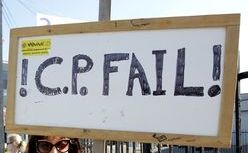 The most recent
string of
four derailments began on February 28, when a freight train
hauling
grain and empty automobile carriers left the tracks just west of
the
Banff Alberta town site. The next day, more than two dozen cars
of a CP
train carrying grain and potash derailed just south of Carlos,
Minnesota, and on March 2, a number of cars
carrying diesel and grain left the rails as they crossed a bridge
over
the Kicking Horse River, in virtually the same spot where the
three
workers were killed in January. On March 9, another train
derailed near
the Ogden Yards in Calgary with multiple train cars leaving the
tracks. The most recent
string of
four derailments began on February 28, when a freight train
hauling
grain and empty automobile carriers left the tracks just west of
the
Banff Alberta town site. The next day, more than two dozen cars
of a CP
train carrying grain and potash derailed just south of Carlos,
Minnesota, and on March 2, a number of cars
carrying diesel and grain left the rails as they crossed a bridge
over
the Kicking Horse River, in virtually the same spot where the
three
workers were killed in January. On March 9, another train
derailed near
the Ogden Yards in Calgary with multiple train cars leaving the
tracks.
Christopher Monette, spokesperson for the
Teamsters
Canada Railway Conference (TCRC) told the Calgary Herald that workers
are raising concerns about the potentially dangerous effect on
the
trains of a recent stretch of bitterly cold weather. "Workers are
telling us the trains are becoming harder to control in cold
weather,"
Monette said,
particularly for locomotives operating in especially frigid
conditions
and difficult terrain through the mountain passes.
Monette also said another potential catastrophe
was
narrowly avoided on the same stretch of track through the Spiral
Tunnels where the accident occurred that killed the three workers
last
month. The engineer of a 109-car grain train had to apply the
emergency
brakes to stop an out-of-control westbound locomotive.
Rail safety is a matter of life and death the
union
points out but CP has failed to make any changes in policy since
the
Field derailment. CP is even fighting against taking precautions
while
the investigation of the causes of the fatal crash is
ongoing.
Shortly after the fatal Field disaster, Transport
Canada Minister Marc Garneau issued a ministerial order. The
order
states:
"When a train is stopped by an emergency brake
application on a grade of 1.8 per cent or greater (i.e. mountain
grade), immediately apply a sufficient number of handbrakes, in
accordance with the attached Appendix A, before recharging the
air
brake system to prevent involuntary movement of the
equipment."
The Transportation Safety Board senior
investigator
James Carmichael confirmed that the fatal crash was not due to
anything
the crew did, and that the train started to move on its own.
"We're
going to try to determine why the brakes didn't stay in place,"
he said.
The TCRC fully supported the order. "We can't be
taking
any chances until the exact causes of this tragic derailment are
determined. You can't put a price tag on rail safety -- it's a
matter
of life and death," said Don Ashley, National Legislative
Director of
the TCRC.
But putting a price tag on the lives of workers
and
public safety is exactly what CP is doing. CP Rail has appealed
the
order, claiming the application of handbrakes, "introduces
additional
risks and will have unintended consequences" without clarifying
what
those consequences may be or what should be done in the meantime.
The
Railway
Association of Canada representing companies involved in the
sector and
CN itself are also appealing the Ministerial Order.
Rail workers have direct experience with
operating
conditions in addition to having access to scientific opinion
through
their union. They are in the best position to assess whether a
measure
will enhance safety or not. CP has dismissed the informed
conclusions
of the workers about this particular precaution of applying
handbrakes
without
presenting a shred of evidence as to why the measure should not
be
taken. Canadians should raise their voices in solidarity with
rail
workers who continue to defend their safety and that of the
public
within the rail industry.

- Teamsters Canada Rail Conference
-

The Teamsters Canada Rail Conference (TCRC)
posted
the following on its website on March 9, 2019.
***
Sisters & Brothers,
In March of 2018 Arbitrator Clarke ruled in
regards to
the systemic Over Hours violations that go to the core of rail
employees' rest and work-life balance.
The arbitrator accordingly declares that CP has
violated the collective agreement.
The TCRC has further convinced the arbitrator to
issue
a cease and desist order given the high number of examples, even
using
CP's own numbers and explanations, when employees' right to be
off duty
within 10 hours has not been respected. This cease and desist
order
applies as well to those employees who are entitled to be in and
off
duty
within 12 hours.
We Need Your Help!
Sadly, but not surprisingly the company has begun
to
disrespect your right to be off duty within 10 or 12 hours. The
TCRC
has no intention of allowing this to go unchallenged. With that
in mind
we need your help to document the violations. Please fill out
this form
each time you are forced over your hours."
Note: Work-rest rules for rail workers require
that
operating employees who go off-duty after being on-duty in excess
of 10
hours will be off duty for:
a) at the home terminal -- be subject to at least
8
continuous hours off-duty, 'exclusive' of call time if
applicable,
except for yard service employees returning to their regular
shift, who
will be subject to at least 8 continuous hours off-duty,
'inclusive' of
call time if applicable; and
b) at other than the home terminal -- be subject
to at
least 6 continuous hours off-duty, 'exclusive' of call time if
applicable.
5.2.2 At the home terminal, mandatory off-duty
time
shall commence at the point where the operating employee goes
off-duty,
and at other than the home terminal, mandatory off-duty time
shall
commence upon arrival at the accommodations provided by the
railway
company.
5.2.3 When the off-duty time between any shifts
or
tours of duty is less than three hours and the combined on-duty
time of
such shifts or tours of duty is in excess of 10 hours, then the
provisions of subsection 5.2.1 apply at the time the operating
employees last go off-duty. The off-duty time between such shifts
or
tours of duty are not to be
included in the calculation of on-duty time.

The number of rail accidents in Canada increased
from
1,091 to 1,170 in 2017, higher than the five-year average of
1035,
according to the Transportation Safety Board. Accidents involving
dangerous goods increased nine per cent to 125 from 115, with six
resulting in the release of dangerous materials.[1] This is of great concern to the
rail
workers and to public safety. But to the financial oligarchy it
is
another story. Responding to a preliminary report from the
Transportation Safety Board, RBC Capital Markets analyst wrote in
a
research report, "All said, we believe that the statistics are
encouraging in many important areas,
thereby suggesting that the railroads are operating at a high
level of
safety."
CP claims that it takes appropriate measures to
ensure
safety during extreme cold, but its own statistics reveal that
this is
a fraudulent claim.
CP's White Paper, Railroading in the Canadian
Winter
states that cold weather speeds up the rate of air leakage from
the air
brake system, and that speed should be reduced in frigid
temperatures
-- by at least 16 km/h below -25 C and by at least 32 km/h at -35
C.
The report reveals that both train
length and speed rose significantly in just four years from
2013-2017.[2] Train lengths were higher in
January
and February 2017 than the annual average for the years
2013-2016.
Average speeds in January and February 2016 and 2017 were higher
than
the rest of the year averages for 2013- 2015. CP claims that the
significant increase in the length
and speed of trains over the years 2013-2017 is the result of
"significant capital investments, better winter planning, and
other
operational changes." The growing number of accidents, and the
alarming
number of derailments in a very short time tell a very different
story.
Notes
1. White
Paper:
Railroading
in
the
Canadian
Winter.
2.
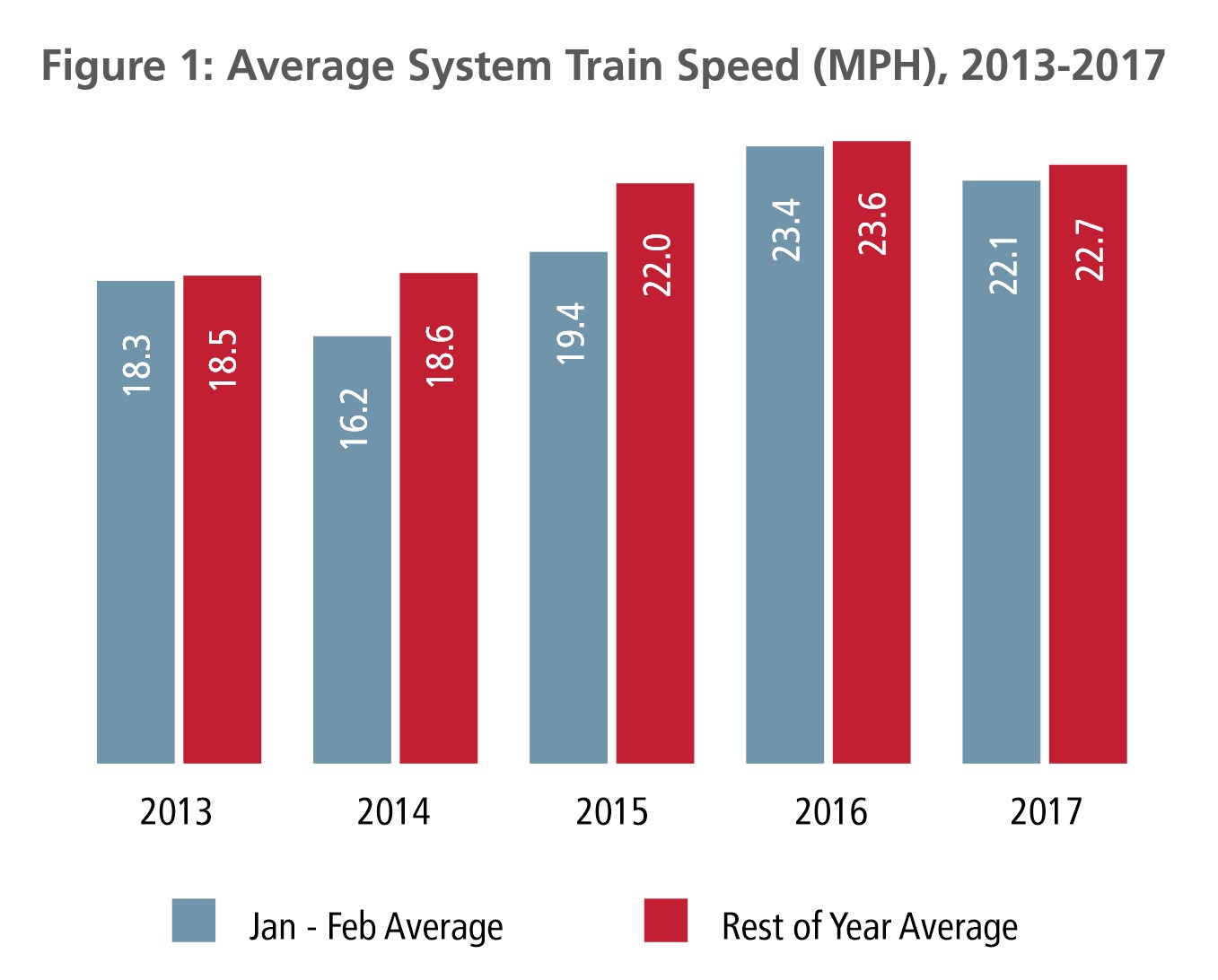
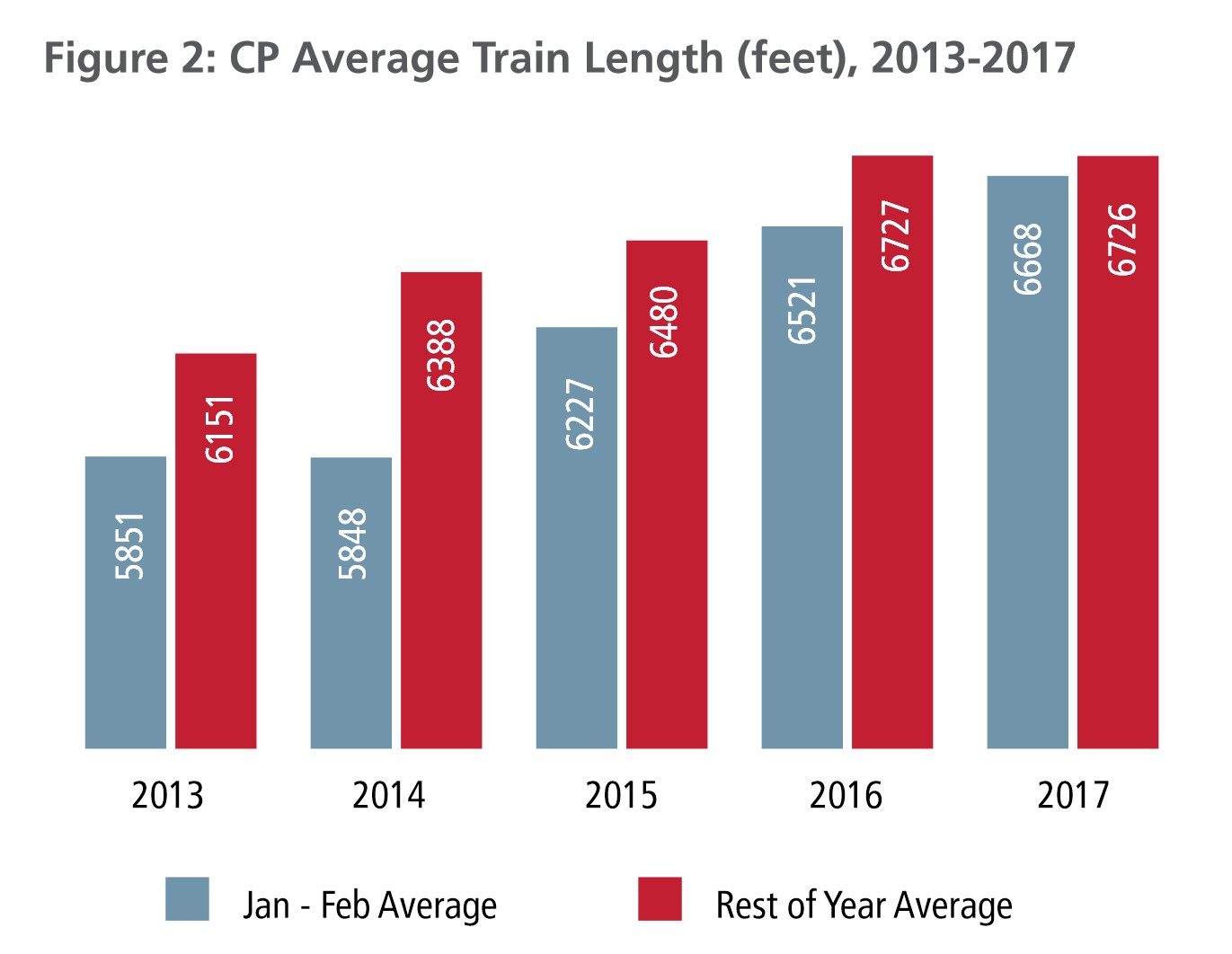

New Brunswick Criminalizes Workers'
Just
Claims
- Interview, Simon Ouellette,
Communications Representative, CUPE Maritimes -

CUPE meeting March 9, 2019 to plan next moves after they were
deprived
of right to strike.
Canadian Union of Public Employees (CUPE) nursing
home
workers in New Brunswick have voted 94 per cent to go on strike
to
defend their demands for wages and working conditions acceptable
to
themselves. The provincial government instead of responding in a
positive and respectful manner applied for and was granted an
order
from
the Court of Queen's Bench to interfere with the workers' right
to
strike in defence of their demands. The day before the 4,100
workers
would have walked off the job on March 10, the court granted an
order
depriving the workers of their right to strike for 10 days.
Regardless of which cartel party has been in
power, the
New Brunswick government has steadily refused to invest in
nursing
homes as a necessary social program to meet the needs and
well-being of
those requiring care and the workers who provide the care.
Instead,
governments have continually said that workers and the
Association of
Nursing Homes must negotiate within the investment parameters of
the
government of the day pretending that those who hold the purse
strings
and decide how the value of nursing homes is realized are
detached from
the issue other than to interfere with workers' rights.
On March 11, nursing homes workers and allies
held
demonstrations in Saint John, Shippagan, Edmundston, and other
cities
to protest the court order and interference in their right to
strike in
defence of their claim on the value they produce for society and
a say
on their working conditions.
Workers' Forum interviewed Simon
Ouellette, the
Communications Representative for the Maritimes Office of the
Canadian
Union of Public Employees.
***

Picket March 11, 2019 outside Deputy Premier Robert Gavin's
office in
Shippagan.
Workers' Forum: How many workers are
engaged in the current struggle?
Simon Ouellette: Approximately
4,100
employees, mostly women, work in 46 New Brunswick nursing homes
across
the province. It can be said that they are the support staff in
the
nursing home system: licensed practical nurses, cooks,
maintenance
workers, attendants etc. These nursing homes are operated
privately but
are
funded by the government.
WF: What are the main demands of
the
workers?
SO: We can characterize the demands
as
follows: decent wages so as to solve the crisis of recruitment
and
retention of staff. These questions are interrelated. New
Brunswick has
a population that is rapidly aging. The people who live in
nursing
homes can no longer drive and have reduced mobility. Their need
for
services is
increasing, but the level of staff has not increased and the
wages have
not increased either. Wages have stagnated for more than a
decade. This
is a phenomenon that is happening across New Brunswick, despite
the
economic recovery. What we have is a recovery without wage
increases.
In fact, New Brunswick workers have seen their purchasing
power decline. Nursing home workers are just the tip of the
iceberg.
There are many workers from different sectors whose wages have
stagnated and whose purchasing power has decreased.
 At the heart of the
problem
is recruitment and retention of staff. Without decent wages, the
most
experienced people leave the profession. New recruits work a few
months
and realize that the conditions make no sense and leave the
sector.
There is little incentive to stay because people can find a job
elsewhere. And even that is not always the
case because in rural areas nursing homes are often one of the
largest
employers. There are over 350 staff vacancies at the moment in
nursing
homes
across the province. At the heart of the
problem
is recruitment and retention of staff. Without decent wages, the
most
experienced people leave the profession. New recruits work a few
months
and realize that the conditions make no sense and leave the
sector.
There is little incentive to stay because people can find a job
elsewhere. And even that is not always the
case because in rural areas nursing homes are often one of the
largest
employers. There are over 350 staff vacancies at the moment in
nursing
homes
across the province.
WF: There has been a lot of talk
about
essential services in this fight. Can you tell us more about
that?
SO: There is a law that was passed
in
2009 on essential services in nursing homes in New Brunswick. The
law
designates almost all employees in nursing homes as essential.
Basically, they lost their right to strike. Then, the Supreme
Court of
Canada ruled, in 2015, in relation to a Saskatchewan law, that
the
right to free collective bargaining includes the right to strike
under
the Canadian Charter of Rights
and
Freedoms. In 2018, the New Brunswick
Labour and Employment Board invalidated much of the Essential
Services
in Nursing Homes Act as being in contravention of the
charter.
The employer ended up in a situation where there
is no
essential services designation. It requested that the government
intervene to review the designation of essential services. This
is
happening while we are in the midst of negotiations, and the
employers
are in a situation where the workers have regained their right to
strike that had been
denied. It has been almost ten years since the retention crisis
escalated and there was not a single government that wanted to
tackle
the problem. Employers are asking for a review of the Board's
decision,
which could take years. Rather than be in the courts for years,
we have
people who need to improve their wages and conditions and have
other
things in mind besides going to court. The employer hopes to deal
with
the legal system instead of coming to an acceptable agreement
with the
workers.
WF: Can you tell us more about the
court
order that was issued Saturday, March 9?
SO: The Government of New Brunswick
obtained a court order from the Court of Queen's Bench Saturday.
We
learned about it in the media. They went for an ex parte
order,
which means an order that is made in our absence. We did not even
have
the opportunity to present our arguments. The order says it is
illegal
to
go on strike and hold any kind of job action for the next 10
days. The
penalties are very severe for anyone who violates the court
order.
We find it very irresponsible for the government
to be
involved in the negotiation process using the big stick of the
law in
favour of the employer instead of bringing resources to the table
to
improve the situation. It has been 28 months that we have been
trying
to negotiate an acceptable contract.
The employer has dragged things out and it suits
them
very well that the government is engaging in these legal actions
because it allows the process to drag out so the employers do not
have
to provide better wages and conditions for the workers.
The government may seek an extension of the court
order
to review the issue of the designation of essential services in
nursing
homes. After that, the union will probably appeal if it is not
satisfied and that will never end. This could last for years and
in
practice deny employees a basic right.
We are asking that the government fix the
situation and
ensure that there is fair and equitable bargaining for a
collective
agreement that is acceptable to the workers. We do not want the
important issue of wages and the recruitment and retention of
staff to
be drowned in the legal system.

Nursing home workers picket outside MLA's office, March 11,
2019.

(To access articles
individually
click on the black headline.)
PREVIOUS
ISSUES | HOME
Website: www.cpcml.ca
Email: office@cpcml.ca
|

